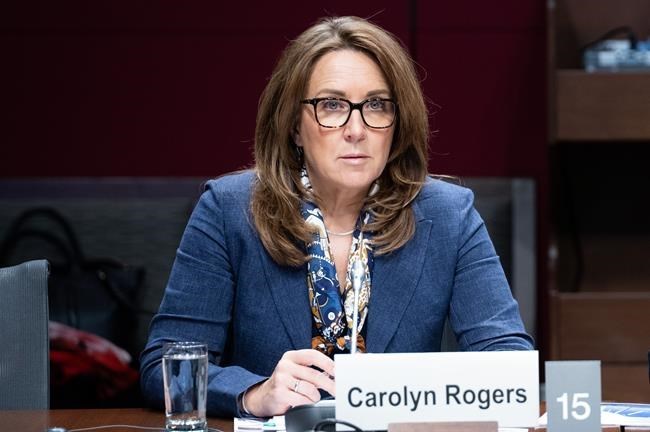VANCOUVER — Bank of Canada senior deputy governor Carolyn Rogers is warning interest rates might not return to the low levels people were used to before the COVID-19 pandemic.
"It may be tempting to believe the low rates that we all got used to will eventually come back. But there are reasons to think they may not," Rogers said in a speech Thursday.
According to her prepared remarks, the senior deputy governor said structural changes to the global economy, such a shift from saving to spending by baby boomers entering retirement, could lead to higher interest rates.
Higher levels of government debt and geopolitical risks such as the war between Israel and Gaza could also push rates higher, she said.
"All this obviously involves a lot of uncertainty. But it’s not hard to see a world where interest rates are persistently higher than what people have grown used to," Rogers said.
The Bank of Canada has aggressively raised interest rates over the past year and a half, taking its key rate target from 0.25 per cent to 5.0 per cent – the highest it’s been since 2001.
The hikes were aimed at bringing down inflation after a rapid run-up in prices post-pandemic.
However, economists have been speculating that rates may not return to the low levels seen pre-pandemic as the world economy undergoes structural shifts.
Canadians are already getting a taste of what it’s like to live with higher interest rates, as more people renew their mortgages at higher rates and face higher borrowing costs.
Rogers said the world is already adjusting to higher interest rates, leaving little "wiggle room" for the global financial system if it were to face a shock.
She said adjusting to higher rates would be a big change for everyone from governments to businesses to households.
"Adjusting early and bit by bit lowers the risk of having to take more abrupt and possibly destabilizing steps later," Rogers said.
The senior deputy governor noted that data shows higher rates are forcing Canadians to curb their spending, while the pace of credit growth among households has slowed.
Businesses are also feeling pressure from rising rates as demand for their goods and services slows and debt-servicing costs rise.
Rogers warned there is more adjustment to come as previous rate hikes filter through the economy.
"The effects of higher interest rates are still working their way through the economy. We’ll need to keep a close eye on both credit stress indicators and survey data to gauge how businesses and households are adjusting," she said.
This report by The Canadian Press was first published Nov. 9, 2023.
The Canadian Press



